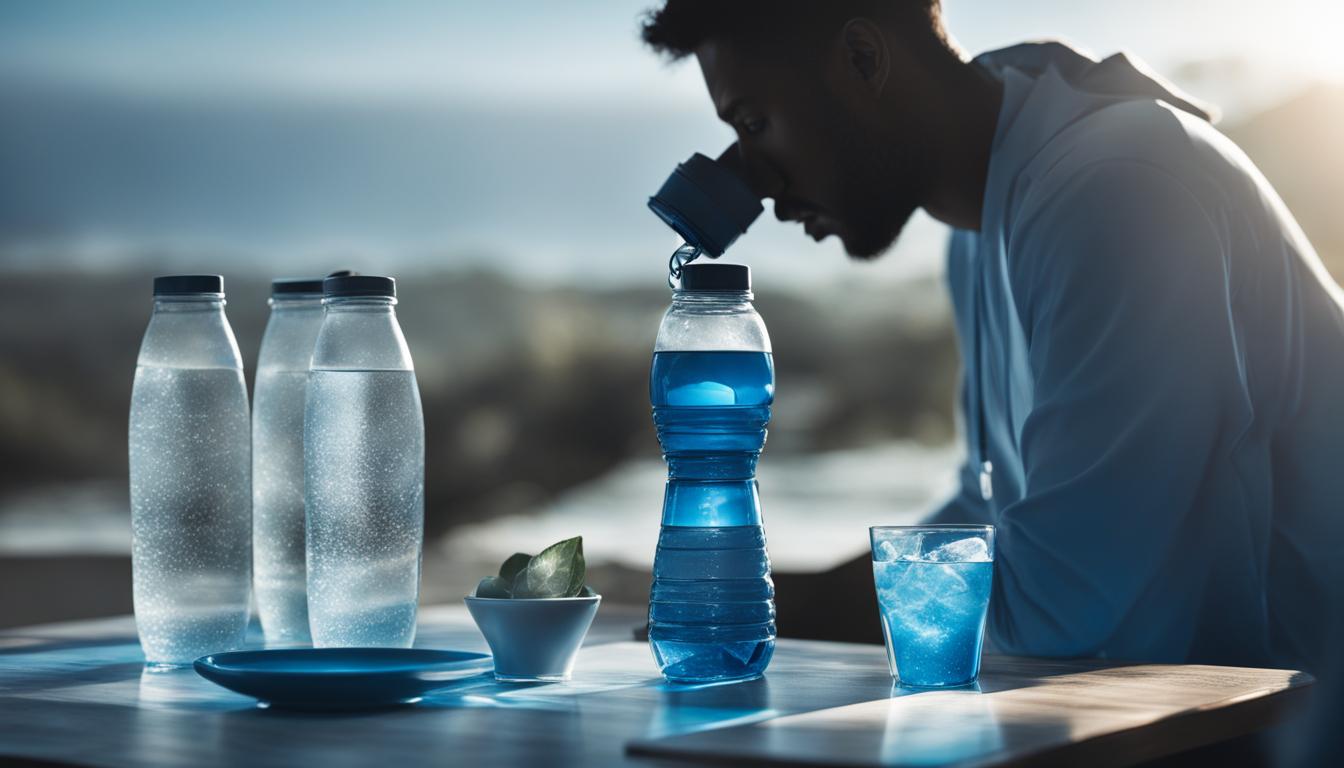Intermittent fasting has gained popularity as a dietary pattern for weight loss and various health benefits. If you’re considering intermittent fasting, you may be wondering if it’s permissible to drink water during your fasting period. Let’s explore the facts to help you stay hydrated and make informed choices.
Key Takeaways:
- Drinking water is generally allowed during intermittent fasting.
- Staying hydrated is important to prevent symptoms like headaches and muscle cramps.
- Choose mineral water or brands that contain natural minerals to maintain electrolyte balance.
- Diluted apple cider vinegar is a calorie-free option that may help suppress appetite.
- Water and other zero-calorie beverages do not break your fast.
What is Intermittent Fasting?
Intermittent fasting is a dietary pattern that involves alternating between periods of eating and fasting. Unlike traditional diets that focus on what to eat, intermittent fasting focuses on when to eat. It is not a specific type of food but rather an eating pattern that has gained popularity for its potential weight loss benefits and various health advantages.
There are different types of intermittent fasting, including the 16/8 method, alternate day fasting, and the 5:2 diet. The 16/8 method involves fasting for 16 hours and restricting the eating window to 8 hours. Alternate day fasting involves alternating between days of normal eating and fasting. The 5:2 diet involves eating normally for five days and restricting calorie intake to 500-600 calories on two non-consecutive days. These variations allow individuals to choose a fasting schedule that best fits their lifestyle and preferences.
Intermittent fasting helps promote weight loss by reducing calorie intake and increasing fat burning. It also offers various health benefits, including improved insulin sensitivity, reduced inflammation, and enhanced brain and heart health. However, it is important to note that intermittent fasting may not be suitable for everyone, especially those with certain medical conditions or who are pregnant or breastfeeding. Consulting a healthcare professional is advised before starting any fasting regimen.
| Type of Intermittent Fasting | Description |
|---|---|
| 16/8 Method | 16 hours of fasting with an 8-hour eating window |
| Alternate Day Fasting | Alternating between days of normal eating and fasting |
| 5:2 Diet | Normal eating for five days and restricting calories on two non-consecutive days |
Can You Drink Water During Intermittent Fasting?
Drinking water is generally allowed and encouraged during intermittent fasting. Water is calorie-free and does not raise blood sugar levels, so it does not break your fast. Staying hydrated is important during fasting to prevent symptoms such as headaches, muscle cramps, dizziness, and fatigue. Water is the best drink to keep you hydrated during fasting, and signs of not getting enough water include the mentioned symptoms.
Benefits of Drinking Water During Fasting
Drinking water while intermittent fasting offers several health benefits. Water is essential for maintaining physical and mental performance, digestion, energy levels, and kidney functions. Staying hydrated during fasting can also help manage feelings of hunger. The Institute of Medicine recommends that adults consume 2.2 liters (9 cups) for females and 3.0 liters (13 cups) for males as total fluids per day, including water.
“Water contributes to physical and mental performance, digestion, general energy levels, and kidney functions.”
The Importance of Staying Hydrated
Staying hydrated while fasting is crucial for supporting various bodily functions. Water makes up a significant percentage of the human body, and drinking adequate amounts helps maintain physical and mental performance, digestion, and kidney functions. Hydration also plays a role in managing feelings of hunger during fasting.
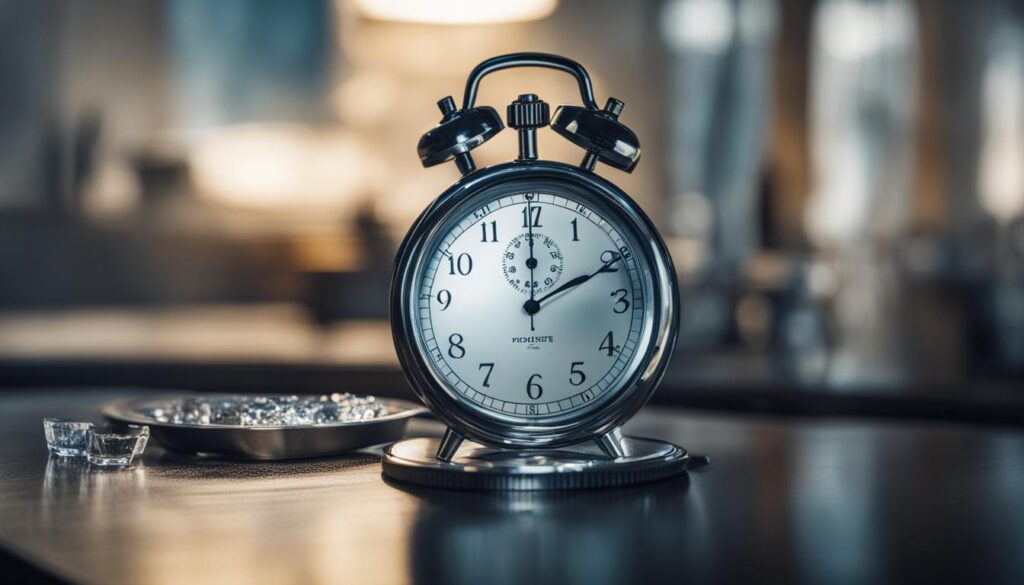
| Benefits of Drinking Water During Fasting | The Importance of Staying Hydrated |
|---|---|
| Improves physical and mental performance | Supports various bodily functions |
| Aids in digestion | Maintains physical and mental performance |
| Boosts energy levels | Helps with digestion |
| Assists kidney functions | Manages feelings of hunger |
What Types of Water Can You Drink While Intermittent Fasting?
When it comes to staying hydrated during intermittent fasting, not all types of water are created equal. While plain water is generally the best choice, there are other options available that can add variety to your fasting routine. Let’s explore the different types of water you can drink while intermittent fasting.
Mineral Water
Mineral water is an excellent choice for staying hydrated during fasting. It contains natural minerals that can help maintain electrolyte balance in your body. Look for brands that either do not remove minerals or replace them after purification, as some bottled water brands remove natural minerals. Mineral water is calorie-free and can be a refreshing option during fasting.
Demineralized Water
Demineralized water, also known as purified or distilled water, has had minerals and impurities removed through a distillation or filtration process. While it may seem like a good choice, it’s important to note that demineralized water lacks essential minerals that help maintain electrolyte balance in your body. It’s recommended to stick to mineral water or plain water rather than demineralized water during intermittent fasting.
Apple Cider Vinegar
Another option to consider during fasting is diluted apple cider vinegar. This natural tonic has no calories and may even help suppress appetite and support weight loss. Add a tablespoon of apple cider vinegar to a glass of water and drink it during your fasting window. Not only will this keep you hydrated, but it may also provide additional health benefits.
Flavored Water
If you’re looking to add some flavor to your water during fasting, flavored water can be an option. However, it’s important to choose flavored water that doesn’t contain any additional calories. Some flavored waters may contain sweeteners or additives that could break your fast. Read the labels carefully and opt for options that are calorie-free and have no added sugars or artificial ingredients.
Overall, the best types of water to drink while intermittent fasting are plain water and mineral water. They are calorie-free and help you stay hydrated during your fasting window. Just remember to choose mineral water that maintains electrolyte balance and avoid demineralized water. You can also consider diluted apple cider vinegar or flavored water, as long as they don’t contain additional calories or ingredients that could break your fast. Hydration is crucial during fasting, so make sure to drink enough water throughout the day to support your body’s needs.
Other Beverages You Can Drink While Intermittent Fasting
Aside from water, there are other calorie-free beverages that can be consumed during intermittent fasting. These beverages can help keep you hydrated and even provide additional benefits. Let’s take a look at some of the options:
Tea
Tea is a popular choice for many people during intermittent fasting. Black tea and herbal tea, such as green tea and chamomile tea, are allowed as long as they are unsweetened. Tea is a hydrating beverage that can help quench your thirst while providing various health benefits. For example, green tea is known for its antioxidant properties, while chamomile tea may help with relaxation and sleep. Just remember to avoid adding any sweeteners or milk to maintain the benefits of fasting.
Coffee
Coffee is another option that can be consumed during fasting hours. Black coffee, without cream, sugar, or artificial sweeteners, is allowed and provides a boost of energy and mental alertness. It can also help suppress appetite and enhance fat burning. However, it’s important to note that some people may experience stomach discomfort or increased heart rate when consuming coffee on an empty stomach. If you experience any negative effects, it may be best to avoid coffee during fasting.
Seltzer
Seltzer, which is carbonated water, can also be consumed while intermittent fasting. It can help curb hunger and provide a refreshing alternative to plain water. Seltzer does not contain any calories or sugar, making it a suitable choice for fasting. However, be mindful of flavored seltzers that may contain artificial sweeteners or other additives that can break your fast. Stick to plain, unflavored seltzer for optimal hydration.
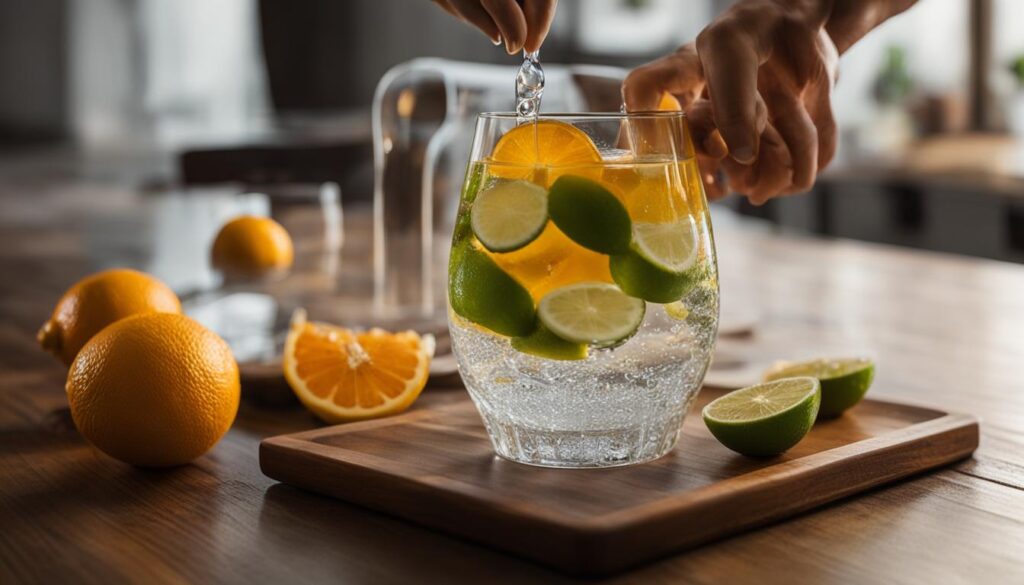
Table: Importance of Hydration While Fasting
| Health Benefits | Explanation |
|---|---|
| Optimal Physical Performance | Water supports the functioning of muscles and joints, helping you stay active and perform at your best. |
| Mental Clarity | Proper hydration improves cognitive function, focus, and concentration. |
| Digestive Health | Water aids in digestion, ensuring the proper breakdown and absorption of nutrients. |
| Kidney Function | Staying hydrated supports optimal kidney function, allowing for the elimination of waste products from the body. |
| Appetite Control | Drinking water can help manage feelings of hunger and reduce unnecessary cravings. |
By prioritizing hydration during fasting, you can optimize your fasting experience and reap the numerous health benefits associated with intermittent fasting.
Drinks to Avoid While Fasting
While intermittent fasting allows for the consumption of certain beverages, there are some drinks that should be avoided to maintain the benefits of fasting. These drinks include diet sodas, coconut water, milk, fruit juices, and alcohol. It is important to steer clear of these beverages as they either contain calories or can cause an insulin response, thus breaking the fast.
Diet sodas, although marketed as low or zero calorie options, can still stimulate an insulin response due to their artificial sweeteners. Coconut water, while often considered a healthy choice, contains natural sugars and can disrupt the fasting state. Milk, fruit juices, and alcohol all contain calories, which can lead to an increase in blood sugar levels and hinder the fasting process.
When practicing intermittent fasting, it is best to stick to calorie-free and unsweetened beverages. These include plain water, mineral water, tea, and coffee without added cream, sugar, or artificial sweeteners. By avoiding drinks that can break the fast, individuals can experience the full benefits of intermittent fasting, such as improved weight loss, enhanced insulin sensitivity, and reduced inflammation.
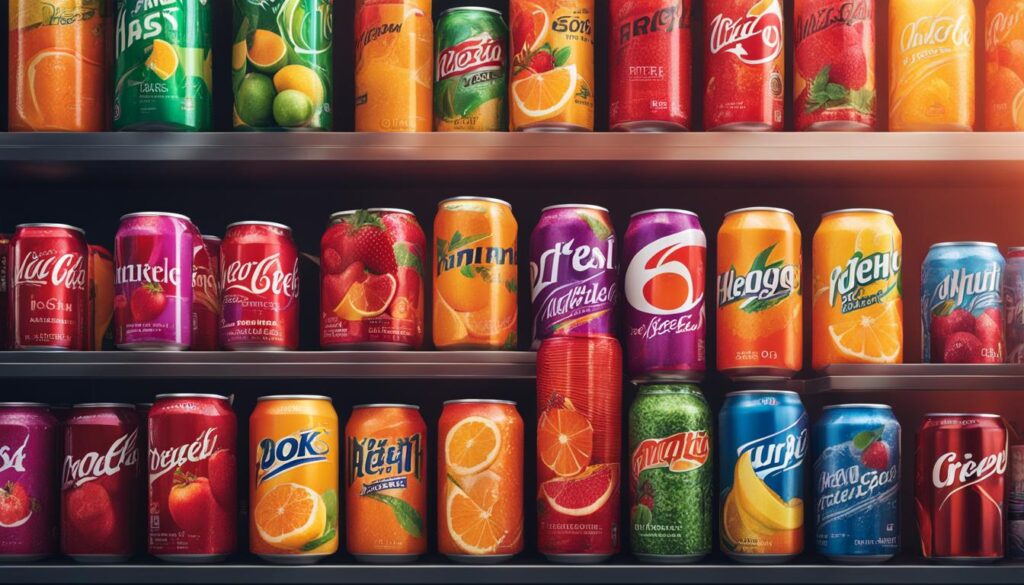
Table: Comparison of Drinks to Avoid While Fasting
| Drink | Calories | Potential Impact on Fasting |
|---|---|---|
| Diet sodas | 0 | Can stimulate insulin response |
| Coconut water | Varies | Contains natural sugars, can disrupt fasting state |
| Milk | Varies | Contains calories, can increase blood sugar levels |
| Fruit juices | Varies | Contains calories, can increase blood sugar levels |
| Alcohol | Varies | Contains calories, can increase blood sugar levels |
By prioritizing calorie-free and unsweetened options while fasting, individuals can maintain the fasting state and optimize their weight loss journey and overall health.
Fasting Before Medical Procedures
Prior to certain medical procedures, fasting is often required to ensure an empty stomach. While fasting, it is important to stay well-hydrated, but guidelines for drinking water may vary depending on the specific procedure. In most cases, clear liquids are allowed up to 2 hours before the procedure begins. However, it is crucial to consult with your healthcare team to understand the specific fasting requirements and guidelines for your procedure.
Clear liquids, including water, are generally permitted before medical procedures to keep the stomach empty and reduce the risk of complications during the procedure. These clear liquids do not contain any solid particles or substances that could interfere with the medical examination or treatment. By avoiding solid foods and sticking to clear liquids, the digestive system remains inactive, allowing for a clear view of the area being examined or treated.
It is important to diligently follow the fasting guidelines provided by your healthcare team to ensure the success and safety of the medical procedure. These guidelines may include specific instructions about when to stop eating and drinking before the procedure, as well as the types of clear liquids that are allowed. By adhering to these guidelines, you can help ensure accurate test results, reduce the risk of complications, and contribute to a smooth and successful medical procedure.
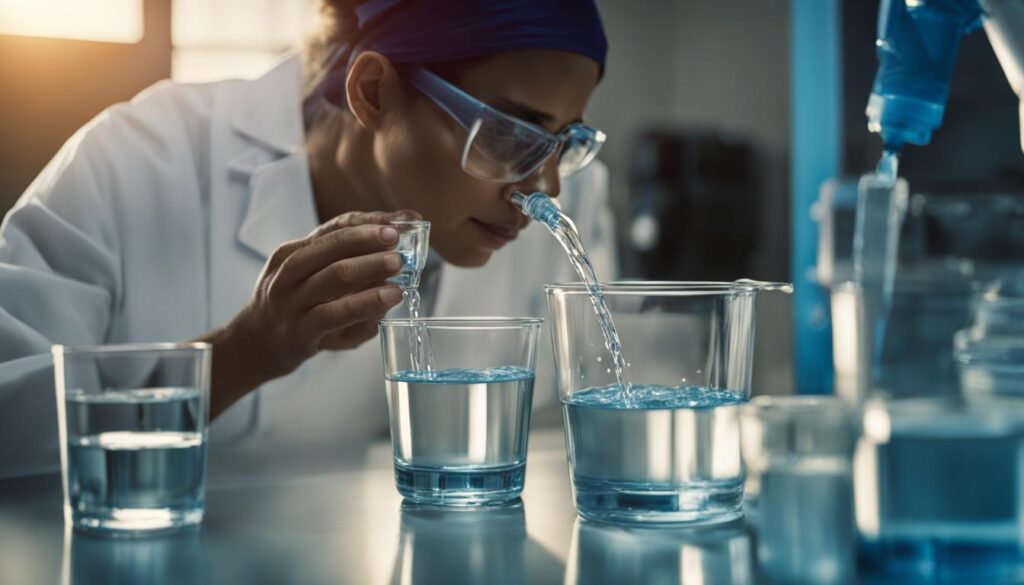
Table: Fasting Guidelines for Common Medical Procedures
| Medical Procedure | Fasting Guidelines |
|---|---|
| Colonoscopy | Fasting for at least 6 hours before the procedure. Clear liquids may be allowed up to 2 hours before the procedure. |
| Upper Endoscopy | Fasting for at least 6 hours before the procedure. Clear liquids may be allowed up to 2 hours before the procedure. |
| Surgery | Fasting for a minimum of 8 hours before the procedure. Clear liquids may be allowed up to 2 hours before the procedure. |
| Blood Tests | No fasting required unless specifically instructed by your healthcare provider. |
The Importance of Hydration While Fasting
Staying hydrated while fasting is crucial for supporting various bodily functions. Water plays a vital role in maintaining physical and mental performance, aiding in digestion, and supporting kidney functions. When you’re fasting, it’s important to ensure that you’re drinking enough water to prevent dehydration and manage feelings of hunger.
The Role of Water in the Body
Water is a fundamental component of the human body, accounting for a significant percentage of our overall composition. It is essential for the transportation of nutrients, regulation of body temperature, and lubrication of joints. Additionally, adequate hydration supports cognitive function and helps maintain healthy digestion and metabolism.
During fasting, our bodies rely on stored fat for energy. As the fat is metabolized, water is released, leading to increased water loss through urine and sweat. This heightened water loss makes it even more important to hydrate properly during fasting periods.
Managing Hunger and Energy Levels
Drinking enough water while fasting can help manage feelings of hunger. Sometimes, dehydration can be mistaken for hunger, leading to unnecessary snacking or overeating. By staying hydrated, you can better differentiate between hunger and thirst, helping to maintain control over your eating patterns.
Proper hydration also helps maintain energy levels throughout the fasting period. Since water is involved in various metabolic processes, being adequately hydrated can support the body’s energy production mechanisms. This can lead to improved cognitive function and physical performance, even when you’re not consuming any food.
Remember to listen to your body and drink water regularly throughout the day to ensure proper hydration. Aim to drink at least the recommended daily intake of water, which is about 2.2 liters (9 cups) for females and 3.0 liters (13 cups) for males. Adjust your water intake based on your individual needs and activity level.
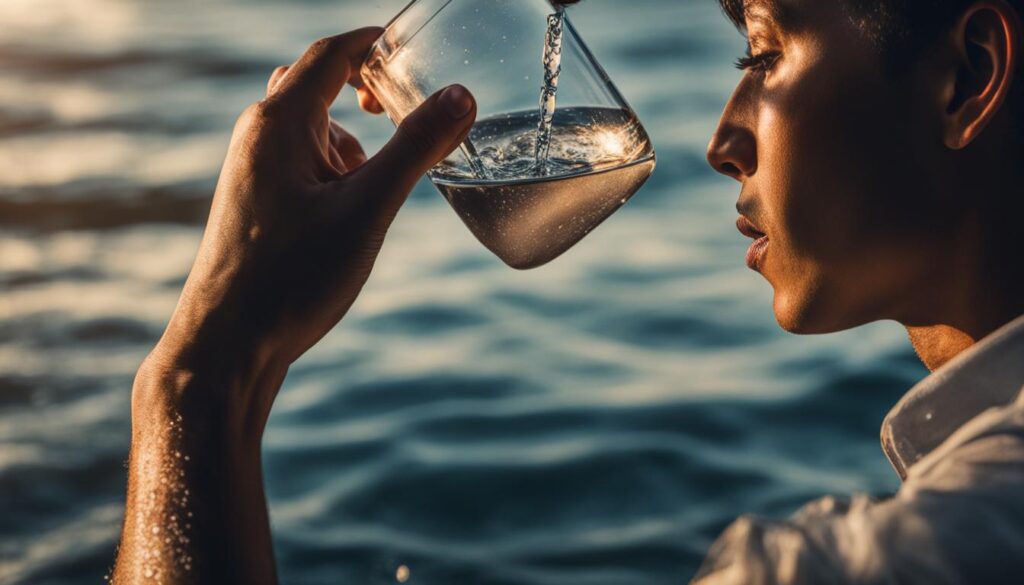
| Benefits of Hydration While Fasting |
|---|
| Supports physical and mental performance |
| Aids in digestion and metabolism |
| Helps manage feelings of hunger |
| Prevents dehydration and associated symptoms |
Conclusion
In conclusion, when it comes to intermittent fasting, staying hydrated is essential. Drinking water is generally allowed during the fasting phase and does not break a fast, as it is calorie-free and does not raise blood sugar levels. It is important to choose the right types of water, such as plain water and mineral water, to maintain hydration and electrolyte balance.
Aside from water, there are other calorie-free beverages that can be consumed while fasting, such as unsweetened tea, coffee without additives, and seltzer. These beverages can help curb hunger and provide additional hydration without breaking a fast. However, it is important to avoid drinks that contain calories or can cause an insulin response, such as diet sodas, coconut water, milk, fruit juices, and alcohol.
Staying hydrated during fasting is crucial for preventing dehydration and symptoms like headaches, muscle cramps, and fatigue. It also plays a role in managing feelings of hunger. Remember to consult with your healthcare team for specific guidelines, especially if fasting before a medical procedure, as their recommendations may vary depending on the situation. By prioritizing hydration and making wise beverage choices, you can support your intermittent fasting journey and reap its potential benefits.
FAQ
Can you drink water while intermittent fasting?
Yes, drinking water is generally allowed and encouraged during intermittent fasting. It is calorie-free and does not break a fast. Staying hydrated is important during fasting to prevent symptoms such as headaches, muscle cramps, dizziness, and fatigue.
What is intermittent fasting?
Intermittent fasting is an eating pattern that involves alternating between periods of eating and fasting. There are different types of intermittent fasting, such as the 16/8 method, alternate day fasting, and the 5:2 diet. It has been used for weight loss and offers various health benefits.
What types of water can you drink while intermittent fasting?
The best types of water to drink during intermittent fasting are plain water and mineral water. Plain water is calorie-free and helps maintain hydration. Mineral water is another calorie-free option that helps maintain electrolyte balance. Diluted apple cider vinegar can also be consumed as it has no calories and may help suppress appetite and support weight loss. Flavored water is allowed as long as it does not contain additional calories.
What other beverages can you drink while intermittent fasting?
Aside from water, other calorie-free beverages that can be consumed during intermittent fasting include unsweetened tea (such as black tea and herbal tea), coffee without cream, sugar, or artificial sweeteners, and seltzer (carbonated water). These beverages do not contain calories that can break a fast.
What are the health benefits of drinking water while intermittent fasting?
Drinking water while intermittent fasting offers several health benefits. It contributes to physical and mental performance, digestion, general energy levels, and kidney functions. Staying hydrated during fasting can also help manage feelings of hunger.
What other beverages should be avoided while fasting?
Drinks to avoid while fasting include diet sodas, coconut water, milk, fruit juices, and alcohol. These drinks either contain calories or can cause an insulin response, breaking the fast. It is best to stick to calorie-free and unsweetened beverages while fasting to maintain the benefits of intermittent fasting.
Should you fast before medical procedures?
Prior to medical procedures, fasting is often required to ensure an empty stomach. Some medical professionals may allow clear liquids, including water, up to 2 hours before the procedure. It is important to consult with your healthcare team for specific guidelines as they may vary depending on the procedure.
Why is hydration important while fasting?
Staying hydrated while fasting is crucial for supporting various bodily functions. Water makes up a significant percentage of the human body, and drinking adequate amounts helps maintain physical and mental performance, digestion, and kidney functions. Hydration also plays a role in managing feelings of hunger during fasting.
Is there a conclusion to drinking water while intermittent fasting?
The conclusion is that drinking water while intermittent fasting is generally allowed and encouraged. It is calorie-free and does not break a fast. Staying hydrated during fasting is important for preventing dehydration and symptoms such as headaches, muscle cramps, and fatigue. Consult with your healthcare team for specific guidelines, especially if fasting before a medical procedure.

